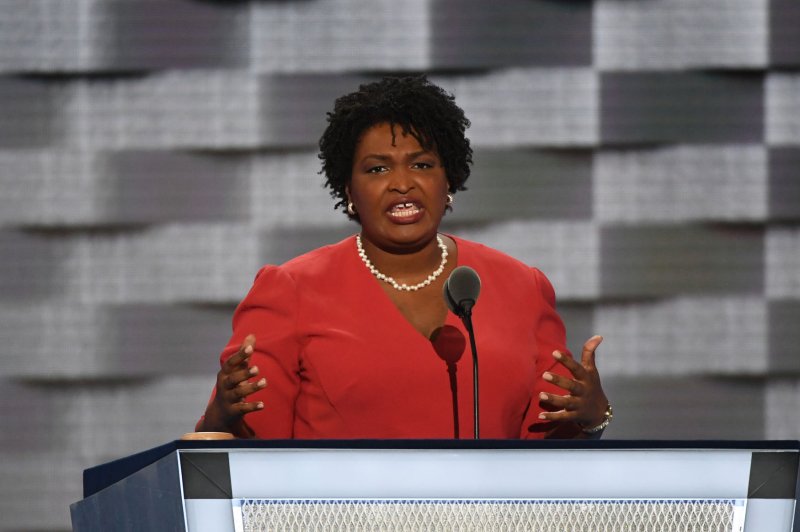Stacey Abrams, founder of the nonprofit Fair Count, says the census is critical to how we live our lives. Photo by Pat Benic/UPI |
License Photo
WASHINGTON, April 2 (UPI) -- The coronavirus outbreak is creating new concerns for those working toward a more accurate count in the 2020 Census.
Wednesday was Census Day -- not a deadline for individuals to complete the census form, but a key reference date for the Census Bureau to determine who gets counted and where.
State leaders, grass-roots community groups and civic engagement organizations have mobilized around the date as a means of driving more people to participate in the Census.
Data from the 2020 Census will be used over the next 10 years to determine electoral maps and to allocate over $1 trillion in federal spending. With much of the nation confined to their homes for the rest of the month at best, advocates are recruiting online volunteers and social media influencers to attract more responses.
"The census is so critical to how we live our lives and it has a direct connection to what's happening today in America," Stacey Abrams, founder of the Fair Count nonprofit, said during a virtual National Press Club event Wednesday.
"The issue of whether our communities and public health systems are prepared to respond to a crisis has to do with how the census was conducted a decade ago," Abrams said. "If we don't have an accurate count, we cannot plan for crises. [The census] tells the story of what's going to happen next."
Organizations like Fair Count typically focus their energy on in-person engagement through local leaders, faith leaders and other community organizers, but the fallout from the pandemic has forced a much greater reliance on mailers, phone banking and especially social media.
To commemorate Census Day, When We All Vote, the national civic engagement organization co-chaired by former first lady Michelle Obama, partnered with Census Counts and ATTN: to launch a video message on social media about the importance of participating in the 2020 Census.
"At a time like this, we are feeling a lot of uncertainty, and it's critical that the people representing us understand our communities and our needs," Selena Gomez, a When We All Vote celebrity co-chair, said in a press release from the organization.
Gomez and other celebrities have been part of a sustained effort to raise awareness of the 2020 Census among younger people and communities of color.
In New York, whose residents have had historically low self-response rates in the census, concern is growing over how to reach communities with little information or understanding of its importance. More than 2,000 people have died of the virus in the city and public life has come to a standstill, forcing community organizers to cancel hundreds of local events, get-togethers and information sessions in March and April.
"While the census message is fairly straightforward -- fill in your data so that it can be aggregated for general use -- that message really comes across best when it's a trusted messenger explaining why the census matters to people," said Linnea Cederberg, a coordinator for the Brooklyn Complete Count Committee.
More aggressive action on social media and text messaging can play a role, but Cederberg pointed out many people will still miss out. A significant portion of households in Brooklyn, for example, do not have access to the Internet and need to be reached offline, through flyers or at point-of-service locations.
Sara Lopez, 24, of Davis, Calif., filled out the census for the first time two weeks ago. She was inspired to participate by a visit to her local ice cream shop, where she read an infographic on the bulletin board about its importance.
"It noted the potential impacts of making sure you complete the census," Lopez said. "So, when we got our letter in the mail, it just reminded me of that. And I thought it was cool that it was online."
In the absence of mass outreach, Cederberg said she hoped younger people would fill out the form and remind older family members to do so as well.
"Voting is important, but it happens every year or every two years or every four years," she said. "The census only happens every 10 years."
In terms of representation, she said, "This is the single biggest civic action you can take."
This is the first U.S. census to offer options to respond online or by phone. The form is available in 13 languages, with additional support in 46 other languages. The 10-minute questionnaire can be accessed at www.my2020census.gov or 1-844-330-2020.















